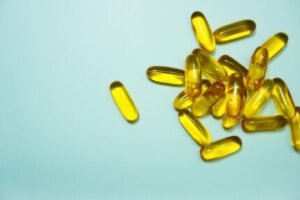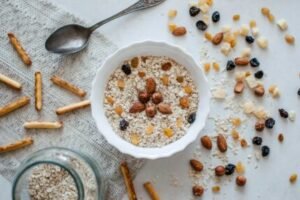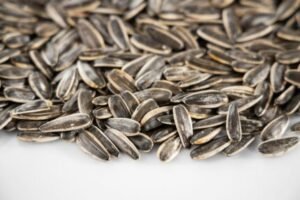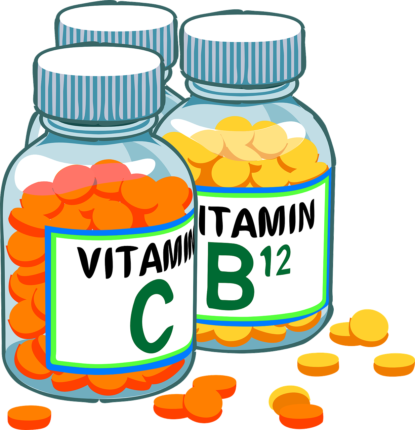Medically reviewed by Dr. Ramesh Gaddam, M.D. — Written by Sumalatha, D.N.H.E
Essential vitamins are organic compounds that are required in small amounts by the human body for normal physiological functioning, growth, and maintenance of health. These vitamins cannot be synthesized in sufficient quantities by the body, so they must be obtained from the diet or, in some cases, through supplements.
Benefits & Dietary Sources
Vitamins are essential micro-nutrients that play crucial roles in various bodily functions.
Find the vital benefits of essential vitamins, from supporting immune function to promoting bone health with their dietary sources.
Vitamin A (Retinol):
Vitamin A, also known as retinol, is a fat-soluble vitamin that plays a critical role in various bodily functions, including vision, immune function, reproduction, and cellular communication.

Vision
Vitamin A is essential for maintaining healthy vision, particularly in low-light conditions.
It is a component of rhodopsin, a protein in the retina that is necessary for night vision.
A deficiency in vitamin A can lead to night blindness and, in severe cases, even permanent blindness.
Immune Function
Vitamin A is important for supporting the immune system by promoting the production and function of white blood cells, which are essential for fighting infections.
It helps maintain the integrity of mucosal surfaces in the body, such as the lining of the respiratory, gastrointestinal, and urinary tracts, which serve as barriers against pathogens.
Cell Growth and Differentiation
Vitamin A is involved in regulating cell growth, differentiation, and proliferation.
It plays a crucial role in the development and maintenance of various tissues, including skin, epithelial tissues, and the lining of the respiratory and digestive tracts.
Reproduction and Fetal Development
Adequate levels of vitamin A are important for reproductive health in both males and females.
During pregnancy, vitamin A is crucial for normal fetal development, including the development of organs, limbs, and the central nervous system.
Antioxidant Properties
Vitamin A acts as an antioxidant, helping to neutralize harmful free radicals in the body, which can otherwise damage cells and contribute to various chronic diseases, including cardiovascular disease and cancer.
Dietary Sources:
Good dietary sources of vitamin A include:
- liver,
- fish liver oils,
- eggs,
- dairy products and certain fruits
- vegetables such as carrots, sweet potatoes, spinach, and kale.
In addition to dietary sources, vitamin A supplements are also available, particularly for individuals at risk of deficiency or those with specific health conditions.
However, excessive intake of vitamin A supplements can be toxic, so it’s important to follow recommended dosage guidelines.
Vitamin B1 (Thiamine)
Vitamin B1, also known as thiamine, is a water-soluble vitamin that plays a crucial role in energy metabolism and the proper functioning of the nervous system. Here are some key aspects of vitamin B1:

Blood Clotting
Vitamin K is essential for the synthesis of several proteins involved in blood clotting, particularly prothrombin and other clotting factors.
These proteins are synthesized in the liver and require vitamin K as a cofactor for their activation.
Vitamin K-dependent clotting factors help form a blood clot at the site of injury to prevent excessive bleeding.
Deficiency in vitamin K can lead to impaired blood clotting and an increased risk of bleeding disorders.
Bone Metabolism
In addition to its role in blood clotting, vitamin K is involved in bone metabolism and mineralization.
Vitamin K helps activate osteocalcin, a protein produced by osteoblasts (cells responsible for bone formation), which is necessary for binding calcium ions to the bone matrix and promoting bone mineralization.
Adequate vitamin K intake is important for maintaining bone density and reducing the risk of osteoporosis and fractures, particularly in older adults.
Vascular Health
Vitamin K may play a role in promoting vascular health and reducing the risk of cardiovascular disease.
It helps activate matrix Gla-protein (MGP), a protein found in blood vessel walls, which helps prevent the calcification of arteries and maintains vascular elasticity.
Adequate vitamin K levels may help reduce the risk of arterial calcification, atherosclerosis, and cardiovascular events.
Regulation of Gene Expression
Vitamin K is involved in the regulation of gene expression, influencing the transcription of genes involved in various physiological processes, including cell growth, differentiation, and apoptosis (programmed cell death).
Vitamin K-dependent proteins have been shown to play roles in cell signaling, inflammation, and tissue repair.
Brain Health
Emerging research suggests that vitamin K may play a role in brain health and cognitive function.
Vitamin K-dependent proteins are found in the brain, where they may contribute to neuronal development, synaptic function, and protection against neurodegenerative diseases such as Alzheimer’s disease.
Dietary Sources
Good dietary sources of thiamine include:
- whole grains,
- fortified cereals,
- pork, beef, liver,
- nuts, seeds, legumes, and
- yeast
Most people can meet their thiamine requirements through a balanced diet, but certain populations, such as individuals with alcohol use disorder or gastrointestinal disorders that impair nutrient absorption, may be at risk of deficiency and may require supplementation under medical supervision.
Vitamin B2 (Riboflavin)
Vitamin B2, also known as riboflavin, is a water-soluble vitamin that plays essential roles in energy metabolism, antioxidant defense, and the maintenance of healthy skin, eyes, and nervous system.

Here are some key aspects of vitamin B2:
Energy Metabolism
Riboflavin is a precursor to two important coenzymes, flavin mononucleotide (FMN) and flavin adenine dinucleotide (FAD), which are involved in various metabolic pathways, particularly the conversion of carbohydrates, fats, and proteins into energy.
These coenzymes participate in electron transport chains within cells, facilitating the production of adenosine triphosphate (ATP), the primary energy currency of the cell.
Antioxidant Activity
Riboflavin also acts as an antioxidant, helping to neutralize harmful free radicals in the body and reduce oxidative stress.
It works in conjunction with other antioxidants, such as glutathione, to regenerate them after they have neutralized free radicals, thus enhancing the overall antioxidant defense system.
Healthy Skin and Eyes
Riboflavin is important for maintaining healthy skin, eyes, and mucous membranes.
It plays a role in the production of collagen, a protein that provides structure and support to the skin, and it contributes to the maintenance of normal vision.
Riboflavin deficiency can lead to skin disorders, such as dermatitis, as well as ocular symptoms, including sensitivity to light (photophobia), itching, and burning sensations.
Nervous System Function
Riboflavin is involved in the metabolism of certain neurotransmitters, such as serotonin and norepinephrine, which are important for mood regulation and cognitive function.
Adequate riboflavin levels are necessary for optimal nervous system function.
Red Blood Cell Production
Riboflavin plays a role in the synthesis of red blood cells (erythropoiesis) and the maintenance of normal hemoglobin levels.
Deficiency of riboflavin can contribute to anemia, characterized by fatigue, weakness, and pale skin
Dietary Sources
Good dietary sources of riboflavin include:
- dairy products (such as milk, yogurt, and cheese),
- eggs, lean meats (such as chicken and turkey),
- fish,
- green leafy vegetables,
- nuts,
- fortified cereals and grains.
Most people can meet their riboflavin requirements through a balanced diet, but certain populations, such as pregnant and lactating women, may have increased needs for riboflavin.
Vitamin B3 (Niacin)
Vitamin B3, also known as niacin or nicotinic acid, is a water-soluble vitamin that plays crucial roles in energy metabolism, DNA repair, and the synthesis of various hormones and signaling molecules.

Here are some key aspects of vitamin B3:
Energy Metabolism
Riboflavin is a precursor to two important coenzymes, flavin mononucleotide (FMN) and flavin adenine dinucleotide (FAD), which are involved in various metabolic pathways, particularly the conversion of carbohydrates, fats, and proteins into energy.
These coenzymes participate in electron transport chains within cells, facilitating the production of adenosine triphosphate (ATP), the primary energy currency of the cell.
Antioxidant Activity
Riboflavin also acts as an antioxidant, helping to neutralize harmful free radicals in the body and reduce oxidative stress.
It works in conjunction with other antioxidants, such as glutathione, to regenerate them after they have neutralized free radicals, thus enhancing the overall antioxidant defense system.
Healthy Skin and Eyes
Riboflavin is important for maintaining healthy skin, eyes, and mucous membranes.
It plays a role in the production of collagen, a protein that provides structure and support to the skin, and it contributes to the maintenance of normal vision.
Riboflavin deficiency can lead to skin disorders, such as dermatitis, as well as ocular symptoms, including sensitivity to light (photophobia), itching, and burning sensations.
Nervous System Function
Riboflavin is involved in the metabolism of certain neurotransmitters, such as serotonin and norepinephrine, which are important for mood regulation and cognitive function.
Adequate riboflavin levels are necessary for optimal nervous system function.
Red Blood Cell Production
Riboflavin plays a role in the synthesis of red blood cells (erythropoiesis) and the maintenance of normal hemoglobin levels.
Deficiency of riboflavin can contribute to anemia, characterized by fatigue, weakness, and pale skin.
Dietary Sources
Good dietary sources of niacin include:
- meat (such as poultry, beef, and pork),
- fish, eggs, dairy products,
- whole grains, legumes,
- nuts, and seeds
Additionally, niacin is synthesized in the body from the amino acid tryptophan, although the conversion efficiency is relatively low.
In some cases, niacin supplements may be recommended to address specific health concerns or deficiencies, but it’s important to use them under the guidance of a healthcare professional, as high doses of niacin can cause side effects such as flushing and liver toxicity.
Vitamin B5 (Pantothenic Acid)
Vitamin B5, also known as pantothenic acid, is a water-soluble vitamin that is essential for various bodily functions, including energy metabolism, the synthesis of certain hormones and neurotransmitters, and the maintenance of healthy skin and hair.

Here are some key aspects of vitamin B5:
Coenzyme A Formation
Pantothenic acid is a precursor to coenzyme A (CoA), a molecule that plays a central role in numerous metabolic pathways.
CoA is involved in the synthesis and breakdown of fatty acids, the production of cholesterol and steroid hormones, the metabolism of carbohydrates and amino acids, and the formation of acetylcholine, a neurotransmitter important for nerve signaling.
Energy Metabolism
Coenzyme A, derived from pantothenic acid, acts as a cofactor for enzymes involved in the citric acid cycle (also known as the Krebs cycle) and fatty acid oxidation.
These metabolic pathways are responsible for generating adenosine triphosphate (ATP), the primary energy currency of the cell, from the breakdown of carbohydrates, fats, and proteins.
Synthesis of Acetylcholine
Pantothenic acid is required for the synthesis of acetylcholine, a neurotransmitter involved in muscle contraction, memory formation, and cognitive function.
Adequate levels of acetylcholine are important for maintaining proper nervous system function and cognitive health.
Skin Health
Pantothenic acid is often included in skincare products due to its beneficial effects on skin health.
It helps improve the barrier function of the skin, enhance its ability to retain moisture, and accelerate wound healing.
Pantothenic acid deficiency can lead to symptoms such as dry, rough skin, and impaired wound healing.
Hair Health
Pantothenic acid is also believed to play a role in maintaining healthy hair.
It is often included in hair care products and supplements for its purported ability to strengthen hair follicles, improve hair texture, and reduce hair loss.
Dietary Sources
Good dietary sources of pantothenic acid include:
- meat (such as poultry, beef, and pork),
- fish, eggs, dairy products,
- whole grains, legumes,
- nuts, and seeds
Pantothenic acid is widely distributed in foods, so deficiency is rare in healthy individuals who consume a balanced diet.
However, certain factors such as alcoholism, malabsorption disorders, and certain medications can increase the risk of deficiency.
In such cases, pantothenic acid supplements may be recommended under the guidance of a healthcare professional.
Vitamin B6 (Pyridoxine)
Vitamin B6, also known as pyridoxine, is a water-soluble vitamin that plays essential roles in numerous biochemical reactions in the body.

Here are some key aspects of vitamin B6:
Amino Acid Metabolism
Vitamin B6 is involved in the metabolism of amino acids, the building blocks of proteins.
It facilitates the conversion of one amino acid to another and is particularly important for the synthesis of nonessential amino acids, which the body can produce on its own.
Vitamin B6 also helps convert the amino acid tryptophan into niacin (vitamin B3) and serotonin, a neurotransmitter that regulates mood, sleep, and appetite.
Glycogen Breakdown
Vitamin B6 is necessary for the breakdown of glycogen, the stored form of glucose in the body.
It helps activate enzymes involved in glycogenolysis, the process by which glycogen is broken down into glucose for energy production.
Neurotransmitter Synthesis
Vitamin B6 plays a critical role in the synthesis of neurotransmitters, including serotonin, dopamine, epinephrine, and gamma-aminobutyric acid (GABA).
These neurotransmitters are involved in various aspects of nervous system function, including mood regulation, stress response, and cognitive function.
Hemoglobin Synthesis
Vitamin B6 is required for the synthesis of hemoglobin, the protein in red blood cells that carries oxygen from the lungs to tissues throughout the body.
Adequate levels of vitamin B6 are necessary for the production of healthy red blood cells and the prevention of anemia.
Immune Function
Vitamin B6 is involved in the functioning of the immune system.
It helps maintain the health and activity of white blood cells, which are essential for fighting infections and foreign invaders.
Gene Expression
Vitamin B6 is involved in the regulation of gene expression, influencing the transcription of DNA into RNA and the translation of RNA into proteins.
It plays a role in the synthesis of certain proteins involved in cell growth, differentiation, and proliferation.
Dietary Sources:
Good dietary sources of vitamin B6 include:
- poultry,
- fish,
- lean meats,
- eggs,
- dairy products,
- legumes,
- nuts, seeds, whole grains, and
- fortified cereals.
Most people can meet their vitamin B6 requirements through a balanced diet, but certain populations, such as pregnant and lactating women, may have increased needs for vitamin B6.
In some cases, vitamin B6 supplements may be recommended to address specific health concerns or deficiencies, but it’s important to use them under the guidance of a healthcare professional, as excessive intake of vitamin B6 can cause neurological symptoms.
Vitamin B7 (Biotin)
Vitamin B9 (Folate or Folic Acid)
Vitamin B9, also known as folate or folic acid (the synthetic form of folate found in supplements and fortified foods), is a water-soluble vitamin that plays essential roles in DNA synthesis, cell division, and red blood cell formation.

Here are some key aspects of vitamin B9:
DNA Synthesis and Cell Division
Folate is necessary for the synthesis and repair of DNA, the genetic material found in every cell of the body.
It is particularly important during periods of rapid cell division and growth, such as fetal development, infancy, and adolescence.
Folate is required for the production of nucleotides, the building blocks of DNA, and for the proper functioning of enzymes involved in DNA synthesis and repair.
Red Blood Cell Formation
Folate is essential for the formation of red blood cells (erythropoiesis).
It plays a role in the maturation of red blood cell precursors in the bone marrow and helps ensure the proper production of hemoglobin, the protein that carries oxygen from the lungs to tissues throughout the body.
Folate deficiency can lead to megaloblastic anemia, characterized by large, immature red blood cells and symptoms such as fatigue, weakness, and shortness of breath.
Neural Tube Formation
Adequate folate intake before and during early pregnancy is critical for preventing neural tube defects (NTDs) in newborns, such as spina bifida and anencephaly.
Folate is necessary for the closure of the neural tube, the embryonic structure that eventually develops into the brain and spinal cord.
Supplementation with folic acid before conception and during the first trimester of pregnancy has been shown to reduce the risk of NTDs by up to 70%.
Homocysteine Metabolism
Folate is involved in the conversion of homocysteine, an amino acid, into methionine, another amino acid.
Elevated levels of homocysteine in the blood are associated with an increased risk of cardiovascular disease, stroke, and other health problems.
Adequate folate intake, along with vitamins B6 and B12, helps lower homocysteine levels and reduce the risk of these conditions.
Brain Function and Mental Health
Folate is important for normal brain function and mental health.
It is involved in the synthesis of neurotransmitters such as serotonin, dopamine, and norepinephrine, which play key roles in mood regulation, cognition, and behavior.
Folate deficiency has been linked to depression, cognitive impairment, and other neurological disorders.
Dietary Sources
Good dietary sources of folate include:
- leafy green vegetables (such as spinach, kale, and lettuce),
- legumes (such as lentils, beans, and peas),
- fruits (such as oranges, bananas, and avocados),
- fortified grains and
- cereals,
- liver,
- eggs, and nuts
Pregnant women are often advised to take a folic acid supplement (400 to 800 micrograms per day) to reduce the risk of neural tube defects in their babies.
However, it’s important to consult with a healthcare professional before starting any supplementation regimen.
Vitamin B12 (Cobalamin)
Vitamin B12, also known as cobalamin, is a water-soluble vitamin that plays crucial roles in various physiological processes in the body.

Here are some key aspects of vitamin B12:
DNA Synthesis and Cell Division
Vitamin B12 is essential for the synthesis of DNA, the genetic material found in every cell of the body.
It is particularly important for rapidly dividing cells, such as those found in bone marrow, where red blood cells are produced.
Vitamin B12 works together with folate to facilitate DNA synthesis and cell division.
Red Blood Cell Formation
Vitamin B12 plays a key role in the formation of red blood cells (erythropoiesis).
It is necessary for the maturation of red blood cell precursors in the bone marrow and for the proper production of hemoglobin, the protein that carries oxygen from the lungs to tissues throughout the body.
Deficiency of vitamin B12 can lead to megaloblastic anemia, characterized by large, immature red blood cells and symptoms such as fatigue, weakness, and shortness of breath.
Nervous System Function
Vitamin B12 is important for the proper functioning of the nervous system.
It plays a role in the synthesis of myelin, a fatty substance that insulates nerve fibers and facilitates the transmission of nerve impulses.
Vitamin B12 deficiency can lead to neurological symptoms such as tingling or numbness in the hands and feet, muscle weakness, difficulty walking, memory loss, and cognitive impairment.
Homocysteine Metabolism
Vitamin B12 is involved in the conversion of homocysteine, an amino acid, into methionine, another amino acid.
Elevated levels of homocysteine in the blood are associated with an increased risk of cardiovascular disease, stroke, and other health problems.
Adequate intake of vitamin B12, along with folate and vitamin B6, helps lower homocysteine levels and reduce the risk of these conditions.
Energy Metabolism
Vitamin B12 is involved in the metabolism of carbohydrates, fats, and proteins, helping convert these macronutrients into energy that the body can use for various cellular processes.
It works together with other B vitamins to facilitate energy production and metabolism.
Dietary Sources
Good dietary sources of vitamin B12 include:
- animal products such as meat (particularly liver and kidney),
- poultry,
- fish, shellfish,
- eggs, and
- dairy products
Plant-based sources of vitamin B12 are rare, but some fortified foods and supplements are available for individuals following vegetarian or vegan diets.
Additionally, vitamin B12 can be synthesized by bacteria in the gut, but the body’s ability to absorb this vitamin from the colon is limited, so dietary sources are necessary to prevent deficiency.
Vitamin C (Ascorbic Acid)
Vitamin C, also known as ascorbic acid, is a water-soluble vitamin that is essential for various physiological functions in the body.

Here are some key aspects of vitamin C:
Antioxidant Properties
Vitamin C is a powerful antioxidant that helps neutralize harmful free radicals in the body.
Free radicals are highly reactive molecules that can damage cells, proteins, and DNA, contributing to aging and the development of chronic diseases such as cancer, cardiovascular disease, and neurodegenerative disorders.
Collagen Synthesis
Vitamin C plays a crucial role in the synthesis of collagen, a protein that provides structure and support to tissues throughout the body, including skin, bones, cartilage, and blood vessels.
Collagen is necessary for wound healing, tissue repair, and the maintenance of healthy skin, hair, and nails.
Vitamin C acts as a cofactor for enzymes involved in the hydroxylation of proline and lysine residues within collagen molecules, which is essential for collagen stabilization and cross-linking.
Immune Function
Vitamin C is important for the proper functioning of the immune system.
It helps stimulate the production and activity of white blood cells, which are essential for fighting infections and foreign invaders.
Vitamin C also enhances the function of phagocytes, specialized immune cells that engulf and destroy pathogens.
Iron Absorption
Vitamin C enhances the absorption of non-heme iron (the form of iron found in plant-based foods and supplements) from the intestines.
It forms a complex with iron in the gut, making it more soluble and facilitating its uptake into intestinal cells.
This is particularly important for individuals at risk of iron deficiency anemia, such as pregnant women, menstruating individuals, and vegetarians or vegans who consume predominantly plant-based diets.
Antiviral and Antimicrobial Properties
Vitamin C has been shown to exhibit antiviral and antimicrobial properties, helping to inhibit the replication of certain viruses and bacteria.
It may reduce the severity and duration of respiratory infections such as the common cold and flu.
Neurotransmitter Synthesis
Vitamin C is involved in the synthesis of neurotransmitters such as dopamine, norepinephrine, and serotonin, which play important roles in mood regulation, cognition, and behavior.
Dietary Sources
Good dietary sources of vitamin C include:
- citrus fruits (such as oranges, lemons, and grapefruits),
- strawberries,
- kiwifruit,
- guava,
- papaya,
- bell peppers (particularly red and green varieties),
- broccoli,
- Brussels sprouts,
- tomatoes, and
- leafy green vegetables.
Most people can meet their vitamin C requirements through a balanced diet, but supplementation may be beneficial for individuals with certain health conditions or those at risk of deficiency.
Vitamin D (Calciferol)
Vitamin D, also known as calciferol, is a fat-soluble vitamin that plays essential roles in bone health, immune function, and overall well-being.

Here are some key aspects of vitamin D:
Bone Health
One of the primary functions of vitamin D is to regulate calcium and phosphorus levels in the body, which are crucial for bone health.
Vitamin D helps enhance the absorption of calcium and phosphorus from the intestines and promotes their deposition into bones, thus contributing to bone mineralization and strength.
Adequate vitamin D intake is important for preventing conditions such as rickets in children and osteomalacia in adults, which are characterized by weak, soft bones.
Calcium Homeostasis
Vitamin D plays a key role in maintaining calcium homeostasis in the body.
It acts on the kidneys to promote the reabsorption of calcium from the urine back into the bloodstream, thus helping maintain stable calcium levels in the blood.
Vitamin D also stimulates the release of calcium from bone stores when blood calcium levels are low.
Immune Function
Vitamin D is involved in modulating the immune system and has been shown to have anti-inflammatory and immunomodulatory effects.
Adequate vitamin D levels are important for supporting immune function and reducing the risk of infectious diseases such as respiratory infections, autoimmune diseases, and certain types of cancer.
Muscle Function
Vitamin D is important for maintaining muscle strength and function.
Adequate vitamin D levels are associated with a lower risk of falls and fractures, particularly in older adults.
Vitamin D may also play a role in muscle protein synthesis and muscle cell proliferation.
Mood Regulation
Vitamin D has been linked to mood regulation and mental health.
Low vitamin D levels have been associated with an increased risk of depression, seasonal affective disorder (SAD), and other mood disorders.
Vitamin D receptors are found in areas of the brain involved in mood regulation, and vitamin D may influence the production and activity of neurotransmitters such as serotonin, which are important for mood stability.
Cardiovascular Health
Emerging research suggests that vitamin D may play a role in cardiovascular health, including blood pressure regulation, vascular function, and the prevention of cardiovascular diseases such as hypertension, heart failure, and stroke.
Dietary Sources
Good dietary sources of vitamin D include:
- fatty fish (such as salmon, mackerel, and tuna),
- fish liver oils,
- egg yolks,
- fortified dairy products (such as milk, yogurt, and cheese),
- fortified plant-based milk alternatives (such as soy milk and almond milk),
- fortified orange juice, and
- fortified cereals.
Additionally, vitamin D can be synthesized by the skin upon exposure to ultraviolet (UV) radiation from sunlight.

However, factors such as geographic location, season, time of day, skin pigmentation, and sunscreen use can affect the body’s ability to produce vitamin D from sunlight.
In some cases, vitamin D supplements may be recommended to ensure adequate intake, particularly for individuals at risk of deficiency.
Vitamin E (Tocopherol)
Vitamin E, also known as tocopherol, is a fat-soluble vitamin with antioxidant properties that is essential for various physiological functions in the body.

Here are some key aspects of vitamin E:
Antioxidant Properties
Vitamin E is a potent antioxidant that helps neutralize harmful free radicals in the body.
Free radicals are highly reactive molecules that can damage cells, proteins, and DNA, contributing to aging and the development of chronic diseases such as cancer, cardiovascular disease, and neurodegenerative disorders.
Vitamin E helps protect cell membranes and lipids from oxidative damage by scavenging free radicals and preventing lipid peroxidation.
Immune Function
Vitamin E plays a role in supporting immune function and enhancing the body’s defense against infections and diseases.
It helps regulate the production and activity of immune cells, such as T cells and B cells, and modulates inflammatory responses.
Vitamin E supplementation has been shown to improve immune function in older adults and individuals with certain medical conditions.
Skin Health
Vitamin E is important for maintaining healthy skin and promoting wound healing.
It helps protect the skin from damage caused by UV radiation, environmental pollutants, and other external factors.
Vitamin E has moisturizing and anti-inflammatory properties, and it helps reduce the appearance of scars and wrinkles.
Vitamin E is often used in skincare products and supplements for its beneficial effects on skin health.
Cardiovascular Health
Vitamin E may play a role in promoting cardiovascular health and reducing the risk of cardiovascular diseases such as heart disease and stroke.
It helps prevent the oxidation of low-density lipoprotein (LDL) cholesterol, which is a risk factor for atherosclerosis and coronary artery disease.
Vitamin E also has anti-inflammatory properties that may help protect blood vessels and improve endothelial function.
Eye Health
Vitamin E is important for maintaining healthy eyes and reducing the risk of age-related eye diseases such as macular degeneration and cataracts.
It helps protect the cells of the retina from oxidative damage and may help preserve visual acuity and protect against age-related vision loss.
Reproductive Health
Vitamin E is involved in maintaining reproductive health and fertility in both males and females.
It helps protect sperm cells from oxidative damage and may improve sperm quality and motility. In females, vitamin E may help support healthy egg development and hormone balance.
Dietary Sources:
Good dietary sources of vitamin E include:
- nuts and seeds (such as almonds, sunflower seeds, and hazelnuts),
- vegetable oils (such as sunflower oil, safflower oil, and wheat germ oil),
- green leafy vegetables (such as spinach and kale),
- whole grains,
- avocado, and
- fortified cereals.
Most people can meet their vitamin E requirements through a balanced diet, but supplementation may be beneficial for individuals with certain medical conditions or those at risk of deficiency.
Vitamin K (Phylloquinone)
Vitamin K, specifically phylloquinone (also known as vitamin K1), is a fat-soluble vitamin that plays a crucial role in blood clotting and bone metabolism.

Here are some key aspects of vitamin K:
Blood Clotting
Vitamin K is essential for the synthesis of several proteins involved in blood clotting, particularly prothrombin and other clotting factors.
These proteins are synthesized in the liver and require vitamin K as a cofactor for their activation.
Vitamin K-dependent clotting factors help form a blood clot at the site of injury to prevent excessive bleeding.
Deficiency in vitamin K can lead to impaired blood clotting and an increased risk of bleeding disorders.
Bone Metabolism
In addition to its role in blood clotting, vitamin K is involved in bone metabolism and mineralization.
Vitamin K helps activate osteocalcin, a protein produced by osteoblasts (cells responsible for bone formation), which is necessary for binding calcium ions to the bone matrix and promoting bone mineralization.
Adequate vitamin K intake is important for maintaining bone density and reducing the risk of osteoporosis and fractures, particularly in older adults.
Vascular Health
Vitamin K may play a role in promoting vascular health and reducing the risk of cardiovascular disease.
It helps activate matrix Gla-protein (MGP), a protein found in blood vessel walls, which helps prevent the calcification of arteries and maintains vascular elasticity.
Adequate vitamin K levels may help reduce the risk of arterial calcification, atherosclerosis, and cardiovascular events.
Regulation of Gene Expression
Vitamin K is involved in the regulation of gene expression, influencing the transcription of genes involved in various physiological processes, including cell growth, differentiation, and apoptosis (programmed cell death).
Vitamin K-dependent proteins have been shown to play roles in cell signaling, inflammation, and tissue repair.
Brain Health
Emerging research suggests that vitamin K may play a role in brain health and cognitive function.
Vitamin K-dependent proteins are found in the brain, where they may contribute to neuronal development, synaptic function, and protection against neurodegenerative diseases such as Alzheimer’s disease.
Dietary Sources
Good dietary sources of vitamin K1 (phylloquinone) include:
- green leafy vegetables (such as kale, spinach, broccoli, and Brussels sprouts),
- parsley,
- lettuce, cabbage, and
- other cruciferous vegetables.
Additionally, vitamin K2 (menaquinone) is produced by bacteria in the gut and is also found in fermented foods such as cheese, natto (fermented soybeans), and certain types of meat.
Most people can meet their vitamin K requirements through a balanced diet, but supplementation may be necessary for individuals with certain medical conditions or those at risk of deficiency.
Medically reviewed by Dr. Ramesh Gaddam, M.D.

General Physician, Diabetologist, and Critical Care Specialist.
Discover more from Health Build-Up
Subscribe to get the latest posts sent to your email.


48 thoughts on “13 Essential Vitamins: Benefits, Role, List, Dietary Sources”
Comments are closed.